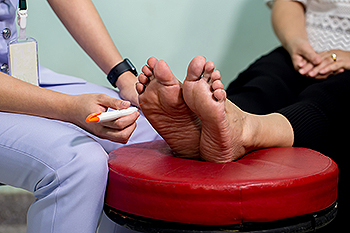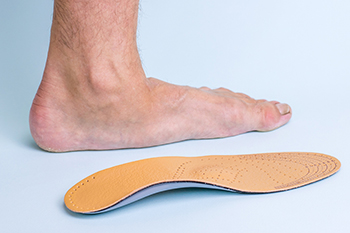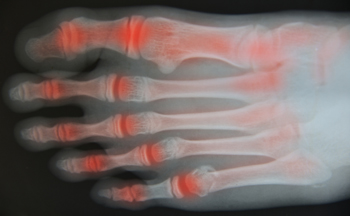
(616) 846-3400
Fax: (616) 846-3406

(616) 846-3400
Fax: (616) 846-3406

When you have diabetes, it is important for you to check your feet each day to make sure you do not have cuts or blisters that are not healing. Since about half of those with diabetes have nerve damage, it can cause one to lose feeling in their feet and they may not be aware there is a problem until it worsens and possibly becomes a more serious issue. It is obvious that the first order of business is managing the diabetes through diet, exercise, and necessary medication, but while this takes place it will be necessary to maintain good foot health practices – washing feet regularly, wearing well-fitting foot coverings, and checking for numbness, tingling, and pain. Those who are older and/or have other physical health problems are said to have a greater risk for complications from diabetic foot problems, such as ulcers or other infections. Since amputation can be the result of untreated foot problems in those with diabetes, it is suggested that regular visits to a podiatrist become part of routine foot health maintenance.
Diabetic foot care is important in preventing foot ailments such as ulcers. If you are suffering from diabetes or have any other concerns about your feet, contact Dr. Robbi Young from Grand Haven Foot & Ankle. Our doctor can provide the care you need to keep you pain-free and on your feet.
Diabetic Foot Care
Diabetes affects millions of people every year. The condition can damage blood vessels in many parts of the body, especially the feet. Because of this, taking care of your feet is essential if you have diabetes, and having a podiatrist help monitor your foot health is highly recommended.
The Importance of Caring for Your Feet
Patients with diabetes should have their doctor monitor their blood levels, as blood sugar levels play such a huge role in diabetic care. Monitoring these levels on a regular basis is highly advised.
It is always best to inform your healthcare professional of any concerns you may have regarding your feet, especially for diabetic patients. Early treatment and routine foot examinations are keys to maintaining proper health, especially because severe complications can arise if proper treatment is not applied.
If you have any questions please feel free to contact our office located in Grand Haven, MI . We offer the newest diagnostic and treatment technologies for all your foot and ankle needs.

The feet, and the arch, bear the body’s weight, and provide support and shock absorption. The arch is composed of several different structures, with the ligaments providing the lion’s share of stability and support. Excessive forces placed on the feet due to obesity can change the foot’s structure, negatively affecting the ligaments of the arch, and even causing flat feet in many overweight people. Studies even suggest that the degree of an overweight person’s flat footedness is directly correlated to their level of obesity, with a higher Body Mass Index (BMI) correlated with a lower plantar arch height. People with flat feet might experience complications such as plantar fasciitis, muscle cramping, arthritis, Achilles Tendonitis, and other forms of foot discomfort or pain. A podiatrist can help anyone, regardless of weight, who is experiencing discomfort from flat feet with custom orthotic devices, supportive shoes, stretching exercises and stretches, physical therapy, pain management medication and more.
Flatfoot is a condition many people suffer from. If you have flat feet, contact Dr. Robbi Young from Grand Haven Foot & Ankle. Our doctor will treat your foot and ankle needs.
What Are Flat Feet?
Flatfoot is a condition in which the arch of the foot is depressed and the sole of the foot is almost completely in contact with the ground. About 20-30% of the population generally has flat feet because their arches never formed during growth.
Conditions & Problems:
Having flat feet makes it difficult to run or walk because of the stress placed on the ankles.
Alignment – The general alignment of your legs can be disrupted, because the ankles move inward which can cause major discomfort.
Knees – If you have complications with your knees, flat feet can be a contributor to arthritis in that area.
Symptoms
Treatment
If you are experiencing pain and stress on the foot you may weaken the posterior tibial tendon, which runs around the inside of the ankle.
If you have any questions please feel free to contact our office located in Grand Haven, MI . We offer the newest diagnostic and treatment technologies for all your foot and ankle needs.
Falling can result in bone breaks or worse, and they are especially prevalent among older people. While there are many causes of falls, such as poor eyesight, hearing, slowing of reflexes, or side effects from medication, foot problems can also impact balance and gait and result in falls. Those with diabetes or circulatory problems need to be particularly careful to examine their feet for problems they might not feel. Simple things one can do to help avoid falling include checking environments for safety hazards, wearing properly fitted and supportive footwear, staying physically active, having regular examinations of ears and eyes, limiting alcohol consumption, using canes or other assistive devices if called for, and being aware of unusual ground conditions. Meeting with a podiatrist to check your feet, help assess risks for falls, and inform you of how to minimize this from happening in the future.
Preventing falls among the elderly is very important. If you are older and have fallen or fear that you are prone to falling, consult with Dr. Robbi Young from Grand Haven Foot & Ankle. Our doctor will assess your condition and provide you with quality advice and care.
Every 11 seconds, an elderly American is being treated in an emergency room for a fall related injury. Falls are the leading cause of head and hip injuries for those 65 and older. Due to decreases in strength, balance, senses, and lack of awareness, elderly persons are very susceptible to falling. Thankfully, there are a number of things older persons can do to prevent falls.
How to Prevent Falls
Some effective methods that older persons can do to prevent falls include:
Falling can be a traumatic and embarrassing experience for elderly persons; this can make them less willing to leave the house, and less willing to talk to someone about their fears of falling. Doing such things, however, will increase the likelihood of tripping or losing one’s balance. Knowing the causes of falling and how to prevent them is the best way to mitigate the risk of serious injury.
If you have any questions, please feel free to contact our office located in Grand Haven, MI . We offer the newest diagnostic and treatment technologies for all your foot care needs.
 The joints in the body are affected when arthritis is present. The toes are a common place for this condition to develop, and it is often accompanied by severe pain and discomfort. Some of the symptoms that patients experience can include loss of toe function, swelling, and inflammation. The most common form of arthritis is known as osteoarthritis, and it affects the cartilage between the joints of the toes. Mild relief may be found when shoes are worn that have adequate room for the toes to move in, and it may also help to use a contrast bath. This is defined as putting the foot in a tub of ice water for several seconds, followed by putting the same foot in a bucket of warm water for the same amount of time. For severe arthritis in the toes, medical attention may be needed for relief. If you have symptoms of arthritis in the toes, please speak with a podiatrist who can guide you toward correct treatment solutions.
The joints in the body are affected when arthritis is present. The toes are a common place for this condition to develop, and it is often accompanied by severe pain and discomfort. Some of the symptoms that patients experience can include loss of toe function, swelling, and inflammation. The most common form of arthritis is known as osteoarthritis, and it affects the cartilage between the joints of the toes. Mild relief may be found when shoes are worn that have adequate room for the toes to move in, and it may also help to use a contrast bath. This is defined as putting the foot in a tub of ice water for several seconds, followed by putting the same foot in a bucket of warm water for the same amount of time. For severe arthritis in the toes, medical attention may be needed for relief. If you have symptoms of arthritis in the toes, please speak with a podiatrist who can guide you toward correct treatment solutions.
Arthritis can be a difficult condition to live with. If you are seeking treatment, contact Dr. Robbi Young from Grand Haven Foot & Ankle. Our doctor can provide the care you need to keep you pain-free and on your feet.
Arthritic Foot Care
Arthritis is a term that is commonly used to describe joint pain. The condition itself can occur to anyone of any age, race, or gender, and there are over 100 types of it. Nevertheless, arthritis is more commonly found in women compared to men, and it is also more prevalent in those who are overweight. The causes of arthritis vary depending on which type of arthritis you have. Osteoarthritis for example, is often caused by injury, while rheumatoid arthritis is caused by a misdirected immune system.
Symptoms
Arthritic symptoms range in severity, and they may come and go. Some symptoms stay the same for several years but could potentially get worse with time. Severe cases of arthritis can prevent its sufferers from performing daily activities and make walking difficult.
Risk Factors
If you suspect your arthritis is affecting your feet, it is crucial that you see a podiatrist immediately. Your doctor will be able to address your specific case and help you decide which treatment method is best for you.
If you have any questions, please feel free to contact our office located in Grand Haven, MI . We offer the newest diagnostic and treatment technologies for all your foot care needs.